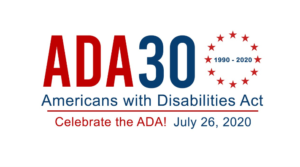
Establishment of the ADA
The ADA was signed into law by President George H. W. Bush in 1990. According to the U.S. Department of Labor, the ADA is a landmark piece of civil rights legislation with the purpose of increasing the inclusion of people with disabilities in all aspects of community life, including employment. Americans with disabilities gained access to places and public services, such as employment and training programs, that were not possible before the ADA.
“The Americans with Disabilities Act broke down barriers to opportunity for millions of American workers,” U.S. Secretary of Labor Eugene Scalia said. “On this anniversary, we recognize and celebrate the access to opportunity created by the ADA. Together with our strong economy, the Act has led to historically low unemployment for American workers with disabilities.”
Statistics Relating to Disability Discrimination
According to the U.S. Equal Employment Opportunity Commission (EEOC), disability discrimination occurs when an employer or other entity covered by the ADA treats a qualified individual with a disability who is an employee or applicant unfavorably because of their disability. It can occur during hiring, termination, wages, training, and promotion opportunities.
The United States Census Bureau stated in 2019 that 9 million people with a disability make up our workforce. The Washington Post found that that between the years of 2010-2017, more than 1 million employment discrimination complaints were filed with the government. Of that number, 252,599 were related to disability or medical discrimination.
In 2014, almost 60% of employment discrimination charges filed in the United States under the ADA were related to discharge, and about 31% involved issues regarding reasonable accommodation. Other common charges filed included terms/conditions, harassment, and discipline.
Tips for Preventing Disability Discrimination in the Workplace
Below are 5 tips for employers to ensure they are compliant with the ADA and are creating equal access and opportunity for all employees in the workplace, particularly disabled employees:
- Review your company’s internal policies to ensure they are compliant with federal, state, and local laws related to individuals with disabilities. The policies should provide applicants and employees that have disabilities notice of the employer’s commitment to creating an environment and having processes in place that support individuals with disabilities.
- Assess every physical area and aspect of the work environment to ensure compliance with the ADA. This includes ensuring the company’s website, online recruiting tools, and in-house digital platforms are accessible to individuals with disabilities. Additionally, employers must assess onsite and remote physical workstations to ensure employees with disabilities have the appropriate desks, chairs, computers, and other tools to successfully do their jobs with reasonable accommodation.
- Review your reasonable accommodation policies and procedures and have a process in place for employees with disabilities to make requests for reasonable accommodations, as needed. Ensure that such requests will be responded to within a reasonable time period.
- Train managers and supervisors on their duties and obligations in managing and supporting employees with disabilities, including managing employees that have approved reasonable accommodations in place.
- Consider employees with disabilities in every decision you make. For example, when planning a team meeting on Zoom, Microsoft Teams, or other online meeting platforms, consider whether the meeting will be facilitated in a way that makes it accessible for all employees participating. If documents or videos will be shared, will the information be presented in a way that allows individuals who may be blind, hard of hearing, or have some other disability to fully participate and engage?
Angela Reddock-Wright is currently available to speak on disability discrimination in the workplace and how employers can ensure they are ADA compliant. You can view Angela’s recent appearance on Spectrum News 1 where she discusses the impact of the ADA 30 years later and its relevance to managing issues of COVID-19 in the workplace here.
For more information and resources regarding the ADA 30-Year Anniversary, visit www.adaanniversary.org
Experienced Employment Law Attorney, Mediator, Arbitrator, Investigator, Legal and Media Commentator
Angela Reddock-Wright is an employment and labor law attorney, mediator, arbitrator, and workplace/Title IX investigator in Los Angeles, CA. Known as the “Workplace Guru,” Angela is an influencer and leading authority on employment, workplace/HR, Title IX, hazing, and bullying issues.
Angela is a regular legal and media commentator and analyst and has appeared on such media outlets as Law and Crime with Brian Ross, Court TV, CNN, ABC, CBS, KTLA-5, the Black News Channel, Fox Soul – The Black Report, NPR, KPCC, Airtalk-89.3, KJLH Front Page with Dominique DiPrima, the New York Times, the Washington Post, the LA Times, People Magazine, Essence Magazine, the Los Angeles Sentinel, LA Focus, Our Weekly and the Wave Newspapers.
Angela also is a member of the panel of distinguished mediators and arbitrators with Judicate West, a California company that represents the gold standard in dispute resolution. She also owns her own law firm, the Reddock Law Group of Los Angeles, specializing in workplace and Title IX discrimination, harassment, and sexual assault investigations.
For more information regarding resources for employers, businesses and employees during this time, connect with Angela on LinkedIn for new updates, or contact her here.
This communication is not legal advice. It is educational only. For legal advice, consult with an experienced employment law attorney in your state or city.
